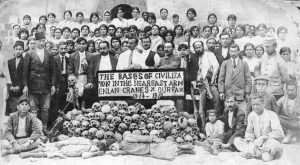6.2 The Armenian Genocide

Periodically over the centuries, the Armenian population in Ottoman Turkey were the targets of persecution. The first Armenian massacre in Turkey occurred under Abdul Hamid II between 1894 and 1896, taking the form of a state-sanctioned pogrom, resulting in the death/murder of hundreds of thousands of Armenians and the destruction of their homes and villages (Genocide Studies Program, 2022; History.com Editors, 2010; Melson, 1982). Although the Armenians hoped their status in Turkey would change under the new “Young Turks” government that came into power in 1908, they continued to be seen, depicted, and treated as a threat to the State (Genocide Studies Program, 2022; History.com Editors, 2010). During WWI, the Armenians were blamed for Turkey’s military and economic losses and portrayed as traitors by Turkish military leaders, who feared they would conspire for independence with European States (Genocide Studies Program, 2022; Hovannisian, 2009; Kévorkian, 2011). The result was increased hostilities directed towards the Armenian population of Turkey.
In April of 1915, Turkish leaders began executing a plan to expel and massacre all Armenians from the country. This marked the start of what is referred to as the Armenian genocide (Kifner, n.d.; Armenian Genocide, n.d.). Through death marches across the Mesopotamian desert and targeted acts of violence by “killing squads/butcher battalions,” 600,000-1.5 million Armenians were murdered (Armenian Genocide, n.d.; History.com Editors, 2010; Kifner, n.d.). The adults who survived were forcibly removed from Turkey, while children were kidnapped and assimilated into Islam and Turkish families (History.com Editors, 2010; Armenian Genocide 1915-1923, n.d.). The Ottomans eventually surrendered in 1918 (History.com Editors, 2010). Although most historians classify what occurred in Turkey as a genocide, as of 2021 the Turkish government has yet to recognize the Armenian Genocide and there are doubts that it ever will (Gutbrod & Wood, 2021; PBS News Hour, 2015).
VIDEO: Armenian Genocide – Lessons from History
The following video provides a summary of what happened in the Armenian genocide and the importance of acknowledging genocide and those who were murdered.
“The word pogrom comes from a Russian word meaning ‘to destroy, to wreak havoc, to demolish violently’.... By the twentieth century,…[it] had become a generic term...for all forms of collective violence directed against...ethnic minorities” (Ratzabi, n.d., para. 1).

